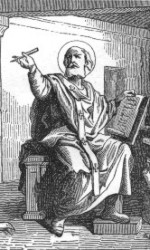
Saint Lucian of Antioch, Martyr
|

Saint Lucian of Antioch, Martyr![]() January 7th
January 7th ![]()
A priest of the Church of Antioch who suffered martyrdom (7 January, 312), during the reign of Maximinus Daza. According to a tradition preserved by Suidas (s.v.), Lucian was born at Samosata, of pious parents, and was educated in the neighbouring city of Edessa at the school of a certain Macarius. Not much faith can be attached to these statements, which are not corroborated by any other author; Suidas very probably confounded the history of Lucian with that of his famous namesake, the pagan satirist of a century earlier. The confusion is easily pardoned, however, as both exhibited the same intellectual traits and the same love for cold literalism.

Early in life Lucian took up his residence at Antioch, where he was ordained presbyter, and where he soon attained a commanding position as head of the theological school in that city. Though he cannot be accused of having shared the theological views of Paul of Samosata, he fell under suspicion at the time of Paul's condemnation, and was compelled to sever his communion with the Church. This breach with the orthodox party lasted during the episcopates of three bishops, Domnus, Timaeus, and Cyril, whose administration extended from 268 to 303. It seems more likely that Lucian was reconciled with the Church early in the episcopate of Cyril (perhaps about 285) than in that of his successor; otherwise it is hard to understand how bishops in the Orient could have received his pupils. Very little is known about the life of Lucian, though few men have left such a deep print on the history of Christianity. The opposition to the allegorizing tendencies of the Alexandrines centred in him. He rejected this system entirely and propounded a system of literal interpretation which dominated the Eastern Church for a long period. In the field of theology, in the minds of practically all writers (the most notable modern exception being Gwatkin, in his "Studies of Arianism", London, 1900), he has the unenviable reputation of being the real author of the opinions which afterwards found expression in the heresy of Arius. In his Christological system ? a compromise between Modalism and Subordinationism ? the Word, though Himself the Creator of all subsequent beings was a creature, though superior to all other created things by the wide gulf between Creator and creature. The great leaders in the Arian movement (Arius himself, Eusebius, the court bishop of Nicomedia, Maris, and Theognis) received their training under him and always venerated him as their master and the founder of their system.
Despite his heterodoxy, Lucian was a man of the most unexceptionable virtue (Eusebius, H. E., VIII, xiii, 2); at the height of the Arian controversy his fame for sanctity was not less than his reputation as a scholar. During the persecution of Maximinus Daza he was arrested at Antioch and sent to Nicomedia, where he endured many tortures and, after delivering a long oration in defence of his faith, was finally put to death. The most enduring memorial of the life of Lucian, next to the Christological controversy which his teachings aroused was his influence on Biblical study. Receiving the literal sense alone he laid stress on the need of textual accuracy and himself undertook to revise the Septuagint on the original Hebrew. His edition was widely used in the fourth century (Jerome, De Vir. III. Ixxvii Praef. ad Paralip.; Adv. Rufium xxvi, Epis., 106). He also published a recession of the New Testament. St. Jerome (De Vir. Ill, 77), in addition to the recension of the Bible, speaks of "Lebelli de Fide", none of which are extant. He is also credited with the composition of a Creed, presented to the Council of Antioch in 341 (Athan., "Ep. de Synod. Arim. et Seleuc". xxiii), but his authorship is doubtful; in fact it is certain he did not compose it in its present form. Rufinus (H. E., IX, vi) has preserved a translation of his apologetic oration. There are epistles mentioned by Suidas; a fragment of one announces the death of Anthimus, a bishop ("Chronicon Paschale in P.G. XCII, 689).
ROUTH, Reliquiae Sacrae, IV, i, 17; Acta SS. Jan. I, 357, 365; BARDENHEWER, Geschichte der altkirchlichen Literatur, II, 235, 241; HARNACK, Die Chronologie der alchristlichen Litteratur, II, 138-146; BATIFOL, Etude d'hagiographie arienne ;La Passion Saint Lucien d'Antioche, compte-rendu au congris scientifique international des Catholiques (Paris, 1891), sect. 11, 181, 186; WESTCOTT, History of the New Testament Canon, 392 sq.; NEWMAN, Arians of the Fourth Century; BARDENHEWER, Patrology, tr. SHAHAN, (St. Louis, 1908).
The Catholic Encyclopedia, Volume IX
Nihil Obstat, October 1, 1910, Remy Lafort, Censor
Imprimatur. +John M. Farley, Archbishop of New York
|
|